
The Waterboys are a rock band formed in 1983 by Scottish musician and songwriter Mike Scott. The band's membership, past and present, has been composed mainly of musicians from Scotland, Ireland, Wales and England. Mike Scott has remained the only constant member throughout the band's career. They have explored a number of different styles, but their music is mainly a mix of folk music with rock and roll. They dissolved in 1993 when Scott departed to pursue a solo career. The group reformed in 2000, and continue to release albums and to tour worldwide. Scott emphasises a continuity between the Waterboys and his solo work, saying that "To me there's no difference between Mike Scott and the Waterboys; they both mean the same thing. They mean myself and whoever are my current travelling musical companions."

The Waterboys is the debut studio album by the Waterboys, released by Ensign Records in July 1983. The album was recorded in several studio sessions between December 1981 and November 1982. Allmusic describes the sound of the album as "part Van Morrison, part U2".
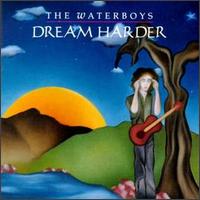
Dream Harder is the sixth studio album by the Waterboys, released by Geffen Records on 24 May 1993. Led by Scottish singer-songwriter-instrumentalist Mike Scott, the album features none of the earlier UK-based band members and instead finds Scott backed by American session musicians. It was the last Waterboys album before Scott spent seven years pursuing a formal solo career, with Bring 'Em All In (1995) and Still Burning (1997). The album reached position 171 on the Billboard Top 200 charts, surpassing the previous Waterboys album Room to Roam, in spite of a less-than-enthusiastic response from critics to the album's sound.

A Pagan Place is the second studio album by the Waterboys, released by Ensign Records on 28 May 1984. It was the first Waterboys record with Karl Wallinger as part of the band and also includes Roddy Lorimer's first trumpet solo for the band on the track "A Pagan Place".

This Is the Sea is the third studio album by the Waterboys, released on 16 September 1985 by Ensign Records. The last of their "Big Music" albums, it is considered by critics to be the finest album of the Waterboys' early rock-oriented sound, described as "epic" and "a defining moment". It peaked at number 37 in the UK Albums Chart. Steve Wickham makes his Waterboys recording debut playing violin on "The Pan Within" and subsequently joined the band. This Is the Sea is the last Waterboys album with contributions from Karl Wallinger, who left the group to form his own band, World Party.

Fisherman's Blues is the fourth studio album by the Waterboys, released by Ensign Records in October 1988. The album marked a change in the band's sound, with them abandoning their earlier grandiose rock sound for a mixture of traditional Irish music, traditional Scottish music, country music, and rock and roll. Critics were divided on its release with some disappointed at the change of direction and others ranking it among the Waterboys' best work. The album was the Waterboys' best selling album, reaching a number 13 placing on the U.K. charts on release, and 76 on the Billboard 200.
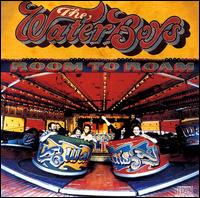
Room to Roam is the fifth studio album by the Waterboys, released by Ensign Records on 2 October 1990. It continued the folk rock sound of 1988's Fisherman's Blues, but was less of a commercial success, reaching #180 on the Billboard Top 200 after its release in October 1990. Critical response continues to be mixed. AllMusic describes it both as "not quite as [musically] successful" as Fisherman's Blues, but also as a "Celtic rock classic". The front and back covers were designed by Simon Fowler based upon photography by Stefano Giovannini and Sean Jackson.

A Rock in the Weary Land is the seventh studio album by the Waterboys, released in 2000 by BMG International. It was their first album after a seven-year break, but mostly continues the hard rock vein of the previous album Dream Harder (1993). The album cover photography is by Steve Gullick.

Too Close to Heaven is a collection of outtakes, alternative versions, and unreleased tracks from The Waterboys' Fisherman's Blues period, released September 2001. The album was released as Fisherman's Blues, Part 2 in the United States with five additional tracks in July of that year.

The Live Adventures of the Waterboys is a concert recording, released by The Waterboys in 1998. Mike Scott refers to this album as an "unofficial release" or bootleg recording, but praises the recording period as a "classic" period for the Waterboys. Most of the live songs on The Live Adventures... had already appeared on the bootlegs A Golden Day (1991) and Born To Be Together (1992). It is the only Waterboys album on which member Guy Chambers appears.

"A Girl Called Johnny" is a song by British band the Waterboys, released in 1983 as the lead single from their debut studio album The Waterboys. The song was written by Mike Scott and produced by Rupert Hine. It reached No. 80 in the UK Singles Chart and remained in the Top 100 for three weeks.
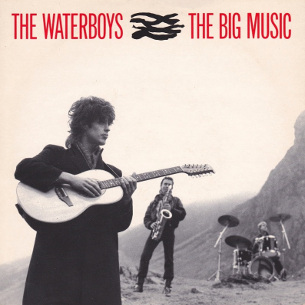
"The Big Music" is a song by British band the Waterboys, released on 2 April 1984 as the lead single from their second studio album A Pagan Place. The song was written and produced by Mike Scott.

"Fisherman's Blues" is a song from folk rock band The Waterboys, which was released in 1988 as the lead single from their fourth studio album of the same name. It was written by Mike Scott and Steve Wickham, and produced by Scott. The song reached number 3 on the US Billboard Modern Rock Tracks chart, number 13 in Ireland and number 32 in the UK.

"And a Bang on the Ear" is a song from Scottish-Irish folk rock band the Waterboys, released on 19 June 1989 as the second single from their fourth studio album, Fisherman's Blues. It was written by Mike Scott, and produced by John Dunford and Scott. The song reached No. 1 in Ireland and No. 51 in the United Kingdom.
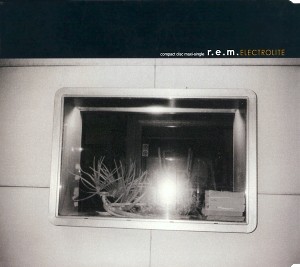
"Electrolite" is a song by American rock band R.E.M., released as the closing track from their tenth studio album, New Adventures in Hi-Fi (1996), and as the album's third single later that year. The song is a piano-based ballad dedicated to Hollywood and the closing twentieth century. Frontman Michael Stipe initially objected to including the song on the album, but was convinced by his bandmates Peter Buck and Mike Mills.

The Getaway is singer Chris de Burgh's sixth original album, released on A&M Records in 1982. It was the first studio album of de Burgh's to chart in the UK, following the compilation Best Moves a year earlier. The album peaked at number 30 in the UK and spent 16 weeks on the chart. In the week beginning 7 February 1983, the album went to the top of the album charts in the then West Germany. In Canada the album spent 36 weeks in the Top 100.
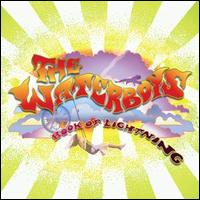
Book of Lightning is the ninth studio album by the Waterboys, released on 2 April 2007 through W14/Universal Records. The album contains ten tracks, produced by Mike Scott and Philip Tennant, with musical contributions from Steve Wickham (fiddle), Richard Naiff (keyboards), Brady Blade (drums), Mark Smith (bass), Leo Abrahams, Jeremy Stacey (drums) plus long-time Waterboys alumni Roddy Lorimer (trumpet), Chris Bruce and Thighpaulsandra (keyboards). Book of Lightning was recorded in London with the exceptions of one song recorded in Vancouver with members of Canadian art-pop band Great Aunt Ida, and another in Scott's home studio.
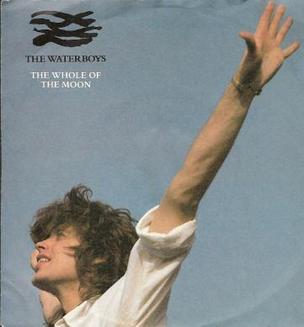
"The Whole of the Moon" is a song by Scottish band the Waterboys, released as a single from their album This Is the Sea in October 1985. It is a classic of the band's repertoire and has been consistently played at live shows ever since its release. Written and produced by Mike Scott, the subject of the song has inspired some speculation.

"Don't Bang the Drum" is a song by British band the Waterboys, released as the opening track on their third studio album, This Is the Sea. It was written by Mike Scott and Karl Wallinger, and produced by Scott. The song was released as a single in Germany and was also issued as a 12" promotional vinyl in the United States.



















